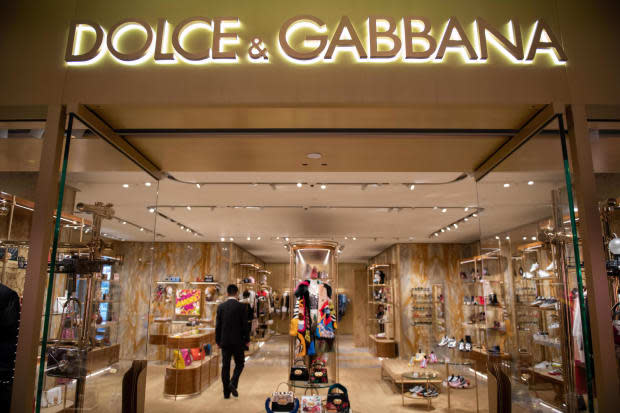How Luxury Brands Are Responding to Coronavirus
Dolce & Gabbana, for one, is funding a research study — as the entire luxury sector takes a sales hit in China.

As coronavirus continues to devastate China and the lives of its citizens, luxury goods companies have begun speaking out about the health crisis — mainly in regards to how it's affecting the health of their business in the region. Kering, owner of Gucci, Saint Laurent and Bottega Veneta, announced last week that it closed half of its luxury brands' stores in mainland China and reduced hours at those that remain open. It's also diverting inventory from China to other regions and pushing back launches and campaigns.
"Our environment has changed significantly with the coronavirus outbreak," Deputy CEO Jean-Francois Palus said during a conference call last Wednesday. "Due to the evolving nature of the situation, it is impossible at this time to fully evaluate its impact on our businesses and how fast [China] will recover."
LVMH reported its latest earnings two weeks before Kering, and executives said at the time that they expected the impact of coronavirus would pass in a few weeks.
"If it dies out in two months or two months and a half, it's not terrible. If it takes two years, that's a different story," CEO Bernard Arnault said during a conference call. Coach owner Tapestry and Versace owner Capri Holdings both also noted in their latest earnings report that sales had begun taking a hit in China.
Given how much luxury brands rely on Chinese shoppers to pad their quarterly earnings, it's no surprise that executives and investors are worried. According to the Financial Times, Jefferies estimates that Chinese buyers accounted for roughly 40% of the €281 billion spent on luxury goods globally last year, but drove 80% of the growth. But what can they do about a global health crisis?
Many corporations have been quick to give money. In late January, WWD announced that LVMH donated about $2.3 million to the Chinese Red Cross Foundation to help it acquire more medical supplies as well as aid in securing more supplies from Europe. Meanwhile, Kering donated about $1 million to the Hubei Red Cross Foundation, L'Oreal contributed $720,000 to the Chinese Red Cross Foundation, Estée Lauder Cos. Inc. donated $290,000, Shiseido donated $140,000 and Swarovski donated $430,000.
But it seems none have gone as far as Dolce & Gabbana, which announced Monday that it has partnered with Humanitas University to fund a coronavirus research project. Specifically, it's looking into the responses of the immune system to the virus and aims to lay the groundwork for "the development of diagnostic and therapeutic interventions" against the disease. Dolce & Gabbana already had a relationship with the university, for which it provides scholarships for medical students.
Of course, Dolce & Gabbana and the other companies that have put money towards this health crisis haven't explicitly cited revenue concerns as the impetus for these charitable moves. But it's no secret that they're all eager to see people healthy and shopping again in a region that's so critical to their bottom lines. And if their efforts do help lead to quicker diagnoses, greater availability of treatment or even a cure, then everybody wins, right?
Never miss the latest fashion industry news. Sign up for the Fashionista daily newsletter.
